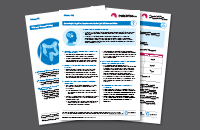 Full Guidelines
Full Guidelines
Click here to view article

 Tools
Tools


 Additional Documents
Additional Documents
Click here to see additional documents

 Endorsements
Endorsements
The Canadian Thoracic Society (CTS) Pediatric Executive Assembly recommends the endorsement of this guideline.

 Calculate by QxMD
Calculate by QxMD
This guideline and KT tool(s) are available on QxMD. Click here to download the app.
Summary of recommendations for clinicians and policy-makers
These recommendations apply to children and youth (5-18 years) and/or their parents who are concerned about the potential for a child or youth to start smoking. These recommendations do not apply to individuals who have cognitive deficits, mental or physical health issues, or a history of alcohol or drug abuse.
The Task Force based the recommendations on the overall balance between the possible benefits and harms of preventive and treatment interventions, weighing the potential benefits of prevention and treatment against any harms.
Recommendations
Prevention
- For children and youth (5-18 years) who do not currently smoke tobacco, whether they have never smoked or are former smokers, we recommend an intervention asking children and youth or their parents about tobacco use and offering brief* information and advice at appropriate primary care visits ** to prevent tobacco smoking.
Weak recommendation, low quality evidence.
Treatment
- For children and youth (5-18 years) who have smoked tobacco within the past 30 days we recommend asking children and youth and/or their parents about tobacco use by the child or youth and offering brief* information and advice at appropriate primary care visits ** to treat tobacco smoking.
Weak recommendation, low quality evidence.
* Contact time with primary care clinician of up to 5 minutes. Advice may include verbal communication about patient attitudes and beliefs, risks of smoking, and/or strategies for dealing with the influence of peers, sharing of printed or electronic material.
**Appropriate primary care visits include scheduled health supervision visits, visits for immunizations or medication renewal, episodic care or acute illness, and other visits where the primary care practitioner deems it appropriate, conducted in primary health care or community settings.
Additional Documents
ECRI Evaluation Scores
ECRI Guidelines Trust scores guidelines based on their adherence to the National Academy of Medicine Standards for Trustworthy Guidelines. Find the ECRI evaluation scores for this guideline here.




